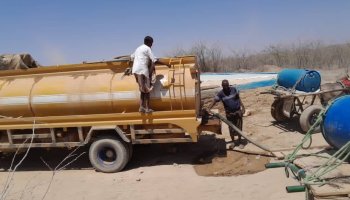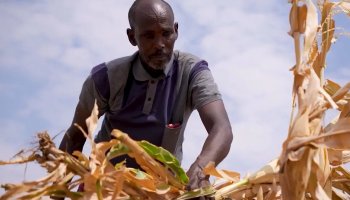This article by: Abdirahman Bashir, First Counsellor and Deputy Ambassador of the Embassy of the Federal Republic of Somalia to the United States of America.
The content of this [report/study/article/publication…] does not reflect the official opinion of the DIPLOMAT NEWS NETWORK.
The views expressed in this article are the author’s own.
- Fatma Abdi is a 29-year old internally displaced Somali living with her 9-year old son. She runs a perfume business in Mogadishu but depends on remittance to sustain her stall, herself and her child's education. Fatma's brother migrated to Germany seven years ago. She received $200 from him every month to sustain her family and business, but this all changed with the onset of COVID-19 pandemic when airports worldwide were closed to curb the virus's spread. Fatma did not receive any money from her brother for three months, and life quickly became unbearable. This has been the story for millions of Somalis who depend on remittances from family members who live in the diaspora. More than 2 million Somalis who send remittances are distributed worldwide with some of the largest communities living in the U.S, the U.K, Germany, Italy, Netherlands and Sweden.
Half of urban Somalis receive remittances, and many say that they will not afford education, health care, and food without them. Remittances from Somalis abroad are estimated at between US$1.3 – 2 billion annually. In 2016 $1.3 billion was sent in remittances, and in 2019, $2.7 billion in remittances was sent to Somalia. This means that the remittances alone contribute to about 23% of the country's GDP- which is $6 billion- and approximately 40% of households in the country are estimated to receive these funds directly. It is also estimated that in recent years, the total foreign remittances surpassed foreign aid. Abdirashid Duale, a Somali who is the chief executive of Dahabshiil, one of the largest money-transfer businesses in Africa, says that such transfers have been a lifeline for Somalis.
These remittances, sent to Somalia every month, usually intensify during crises and emergencies. In 2011, remittances helped Somalia survive the horrific drought. In the cholera outbreak of 2017, remittance funds were used to buy medical supplies, pay for health staff salaries, and protective equipment and supplies. During special occasions such as Ramadhan remittances also record an increase of up to 12% in the first week to cater for food, clothes and toys for the less privileged.
When Somalia first recorded their first case of Coronavirus on 16th March 2020, the authorities knew they would need all the help they could get, especially from Somalis in the diaspora. Unfortunately, this was when the diaspora people could hardly help because Somalis in the diaspora have been gravely affected by the pandemic. Many, who work as casual laborers in different countries, have lost jobs, and are unable to support their families effectively through remittances. According to sources, the volume of remittances had dropped by as much as 50% by April 2020.
Even those who can send money have had trouble doing so because of the banking systems. The flow of remittances from Europe and the United States have, in recent years, been influenced by changes in banking regulations and security procedures that have affected money transfer operators. International banks have long been fearful of handling cash destined for Somalia because of regulations concerning anti-money laundering (AML) and countering the financing of terrorism (CFT) and the risk of large fines for any errors.
The consequence is that huge amounts of banknotes from diaspora host countries have to be carried physically to financial centers, like Dubai and Nairobi before they are taken to Somalia. With the closure of airports to mitigate the spread of COVID-19, the transfer of remittances has been an unfathomable nightmare. To improve the already dire situation, Somali banks and MTBs need to convince international banks that they know the identities of senders and recipients of remittances and international payments in accordance with international AML and CFT standards. It's already a bit easier to track the senders from countries such as the U.S and the U.K because of strict documentation in such countries. For the citizens in Somalia, banks and mobile service providers could issue digital financial identities for the recipients.
Somalia also highly depends on imports for much of its food consumption needs and all of its medical supplies, and the considerable drop in remittances has consequently affected the supply. COVID-19 has also profoundly affected the private sector in Somalia. According to a World Bank report, since the start of the pandemic, about 45% of firms surveyed had to suspend operations, on average for about seven weeks and firms in Mogadishu, exporters, and those in the manufacturing sector were more likely to close. Two-thirds of firms experienced weakened demand while 70% sustained disruptions to their supplies of inputs and raw materials. Sales and employment in June/July also dropped roughly by 30% compared to 2019.
Other than the economic value, remittances are also a testament of the incredible expression of faith, generosity, and solidarity that is common among Somalis. Social ties are strong motivators for why individuals in the diaspora send money to people in Somalia, and many Somalis don't just send money to their immediate families. They send money to distant relatives, friends, former teachers, and sometimes people they have never met. This has long been the case because of an old traditional Somali pastoral system built on a code of hospitality known as martigalis. The code ensured that strangers were helped in their time of need with the assurance that one day when the helping family needed help, they would be accorded the same hospitality.
Unfortunately, several young Somalis living in the diaspora have lost connection and the sense of belonging. They do not feel the same obligation as their elders who fled Somalia 20-30 years ago with the drive to specifically help the collapsed state back to its feet. Many of the younger Somalis were born in the diaspora, and as time goes by there is the fear that they will grow less enthusiastic about sending remittances. In fact, studies indicated that people who communicate less frequently were more likely to send less than $500, but those who frequently communicate with their family members were more likely to send more than $500. That coupled with the ongoing effects of COVID-19 pandemic poses a great threat to remittances in the near future. Remittances clearly play a vital role in the stability of Somalia, but perhaps the long-term solution would be to stop the over-dependence on remittances.









Leave a comment